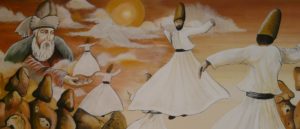By Marria Qibtia Sikandar Nagra
 Ever since the genesis of this world, mankind has quintessentially been infused with the tender emotion of love that has been valued, burgeoned and nourished by futuristic scholars and eminent writers who were well-aware of its indispensability and salience.
Ever since the genesis of this world, mankind has quintessentially been infused with the tender emotion of love that has been valued, burgeoned and nourished by futuristic scholars and eminent writers who were well-aware of its indispensability and salience.
History bears witness to the fact that this abstract notion, gained much pertinence after the Sufis and Dervishes tirelessly propagated it and made it a potential that might alter the very course of individual and collective affairs.
 This article particularly intends to explore the Sufi philosophy of love that is not only enshrined in the tenets of Islam but emanates from the legendary works of Sufi philosophers as Rumi and Shams of Tabriz. It seeks to draw parallel comparative analysis of the East Sufi thought defined by Rumi and Shams and their epic virtues in Elif Shafaq’s acclaimed novel “The Forty Rules of Love” and the West manifested particularly by writers as Walt Whitman who have nurtured a spiritual bent in their practice of writing creatively.
This article particularly intends to explore the Sufi philosophy of love that is not only enshrined in the tenets of Islam but emanates from the legendary works of Sufi philosophers as Rumi and Shams of Tabriz. It seeks to draw parallel comparative analysis of the East Sufi thought defined by Rumi and Shams and their epic virtues in Elif Shafaq’s acclaimed novel “The Forty Rules of Love” and the West manifested particularly by writers as Walt Whitman who have nurtured a spiritual bent in their practice of writing creatively.
LOVE THROUGH THE ACCEPTANCE OF SAMENESS OF MANKIND AND EQUAL EXISTENCE
 Whitman’s immediate life experiences imbued him an understanding of the struggles defining the life of the common man. His centrifugal consciousness extends sympathy as well as empathy towards the marginalized sections of the society including the labourer, the Negro, the leper, the prostitute, and the thief. For Whitman, like Shams there is no difference between a ruler clad in excess riches and a beggar clad in shabby rags.They both occupy the same position in the greater cosmos, since in their hearts lies their true reality, the essence of their existence, and the reflection of God’s divinity.
Whitman’s immediate life experiences imbued him an understanding of the struggles defining the life of the common man. His centrifugal consciousness extends sympathy as well as empathy towards the marginalized sections of the society including the labourer, the Negro, the leper, the prostitute, and the thief. For Whitman, like Shams there is no difference between a ruler clad in excess riches and a beggar clad in shabby rags.They both occupy the same position in the greater cosmos, since in their hearts lies their true reality, the essence of their existence, and the reflection of God’s divinity.
In the first part of “Song of Myself”, Whitman remarks,
Celebrate myself, and sing myself,
And what I assume, you shall assume for every atom belonging to me as good belongs to you.
(Song of Myself, 1)
 Necessitating upon the acceptance of the very fact that as every individual is a creation of the divine being, so deserves to be loved, appreciated and celebrated, irrespective of his social strata’s, ideological dictums, physical appearance or deformities, since they all comprise the “atom” that is a reflection of God in them, a manifestation of the divine hand in their creation .Something similar in vain is expressed by Elif Shafaq in her novel, “The Forty Rules of Love” where she deliberately presents the characters of the Novice, the Beggar, Desert Rose the prostitute in order to stress upon the fact that though these characters belong to varying social hierarchies, they deserve all the love, care and respect that we would generally attribute to a person belonging to the upper strata of the society.
Necessitating upon the acceptance of the very fact that as every individual is a creation of the divine being, so deserves to be loved, appreciated and celebrated, irrespective of his social strata’s, ideological dictums, physical appearance or deformities, since they all comprise the “atom” that is a reflection of God in them, a manifestation of the divine hand in their creation .Something similar in vain is expressed by Elif Shafaq in her novel, “The Forty Rules of Love” where she deliberately presents the characters of the Novice, the Beggar, Desert Rose the prostitute in order to stress upon the fact that though these characters belong to varying social hierarchies, they deserve all the love, care and respect that we would generally attribute to a person belonging to the upper strata of the society.
Shams quite aptly remarked that, “It’s easy to love a perfect God, unblemished and infallible that He is. What is far more difficult is to love fellow human being with all their imperfections and defects. Remember, one can only know what one is capable of loving. There is no wisdom without love unless we learn to love God’s creation, we can neither truly love nor truly know God.” At another point he also states that “the whole universe is contained within a single human being- you. Everything that you see around, including the things that you might not be fond of and even the people you despise or abhor, is present within you in varying degrees.  Therefore, do not look for Shaitan (Satan) outside yourself either. The devil is not an extraordinary force that attacks from without. It is an ordinary voice within you. If you set to know yourself fully, facing with honesty and hardness.”
Therefore, do not look for Shaitan (Satan) outside yourself either. The devil is not an extraordinary force that attacks from without. It is an ordinary voice within you. If you set to know yourself fully, facing with honesty and hardness.”
This makes it quite salient to know that it is the mind of the man that either makes him or breaks him. It is the mental cognition of individuals that compel or restrains them to resort to certain practices that they might not in otherwise situations resort to. Milton did not say it out of the blue that, “the mind in its own place and in itself can make a heaven of a hell and a hell of a heaven.” Possessing a scholarly disposition this is what eminent writers have ben imparting and what Whitman too propagates.
LOVE MANIFESTED THROUGH NATURE 
Whitman being a lover of nature not only endorses the Wordsworthian maternal role played by nature but also echoes it in his poetry. This is quite evident in the sixth section of Whitman’s “Song of Myself.” Upon being asked by a child, “What is grass?, ” he remarks that he does not know what it is, any more than the child himself.
In this way, the process of understanding has begun as the two look-together at the world around them, and then interact with it. They imagine many possible articulations for the grass imagining it to represent varied yet concrete possibilities such as “the white heads of old mothers” and the “red roofs of mouth.” Whitman goes to the point of considering the “curling grass” as a “mother’s lap,” which awaits him for his rest. The maternal instinct of nature indirectly stresses upon the prevalence of the divine presence everywhere.
Elif Shafaq states: You can study God through everything and everyone in the universe, because God is not confined in a mosque, synagogue or church. But if you are still in need of knowing where exactly His abode is, there is only one place to look for him: in the heart of a true lover.
HOPE, HARDSHIPS AND OPTIMISM: BREED LOVE
 Resilience, perseverance and optimism in the face of crisis and adversity are highly pertinent notions advanced by Sufi philosophers particularly Rumi and Shams .The hope that sustains an individual through a critical period is a manifestation of his strong faith and belief in the Almighty, molding him into a strong believer who is at peace with every occurrence in his life since he knows that it is a part of a larger divine plan. The virtue of hope and optimism is propagated by Whitman who believes that at all times one must “keep your face always towards the sunshine and the shadows will fall behind you.”
Resilience, perseverance and optimism in the face of crisis and adversity are highly pertinent notions advanced by Sufi philosophers particularly Rumi and Shams .The hope that sustains an individual through a critical period is a manifestation of his strong faith and belief in the Almighty, molding him into a strong believer who is at peace with every occurrence in his life since he knows that it is a part of a larger divine plan. The virtue of hope and optimism is propagated by Whitman who believes that at all times one must “keep your face always towards the sunshine and the shadows will fall behind you.”
 Elif Shafaq echoes the same message in the novel “Forty Rules of Love” where Shams Tabriz contends, “The midwife knows that when there is no pain, the way for the baby cannot be opened and the mother cannot give birth. Likewise, for a new self to be born, hardship is necessary. Just as clay needs to go through intense heat to become strong, love can only be perfected in pain.” It is indeed intense suffering that makes an individual realize his true worth, his subordination to God and the fact that he needs to be patient and resilient in the accomplishment of his yearnings, dreams and desires.
Elif Shafaq echoes the same message in the novel “Forty Rules of Love” where Shams Tabriz contends, “The midwife knows that when there is no pain, the way for the baby cannot be opened and the mother cannot give birth. Likewise, for a new self to be born, hardship is necessary. Just as clay needs to go through intense heat to become strong, love can only be perfected in pain.” It is indeed intense suffering that makes an individual realize his true worth, his subordination to God and the fact that he needs to be patient and resilient in the accomplishment of his yearnings, dreams and desires.
The all-encompassing practice of love in Sufism and the fact that every single being deserves respect, acknowledgement by virtue of being created by the divine is something that is the ultimate need of the hour. It is time we revert to the simplistic gestures of affection and compassion, the mirror of which we witness in nature itself.









